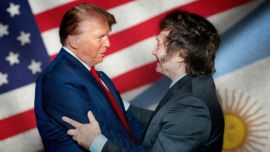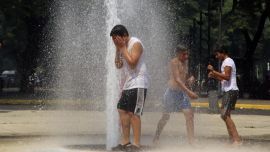US pharmaceutical giant Pfizer has formally submitted documentation to the Argentine heath regulators, requesting authority to roll out its Covid-19 vaccine.
Health minister Ginés González García said he was confident the bid would be swiftly approved by the drug regulator ANMAT (Administración Nacional de Medicamentos, Alimentos y Tecnología Médica), after Britain became the first country in the world to approve the same vaccine on Wednesday.
"If they approved it in the UK, I'm convinced that they have all the required documentation, but it doesn't depend on me, it's a technical decision," the minister told Radio Rivadavia in an interview.
Pfizer will present its case to ANMAT, Argentina’s equivalent of the United States' Food & Drug Administration, with documentation illustrating every stage of the vaccine's development.
The news came as President Alberto Fernández announced Thursday that 300,000 of the nation's most-vulnerable people could be vaccinated using the Russian Sputnik V dose in the next few weeks, followed by 10 million more before the end of February next year.
"This week we're signing the contract with Russia,” he said, speaking on El Destape Radio.
“We're going to be able to vaccinate 300,000 people by the end of the year, five million during January, and five million more during February,” he said, laying out his government’s targets.
Priority will be given to people over the age of 60, essential front-line workers in the health service, police and security forces, teachers, and younger adults in risk groups.
Fernández stressed the urgency of getting as many people vaccinated as quickly as possible, amid fears of a potential second wave of Covid-19 infection in Autumn 2021.
"It's reasonable to think that in the Autumn we could get a second wave of the pandemic in Latin America. And we can minimise its damage by vaccinating as many people as possible during the summer," he said.
The Pfizer jab has been developed in association with a small German company called BioNTech, co-founded only 12 years ago by second generation Turkish immigrants Ugur Sahin and his wife Ozlem Tureci, and Austrian cancer expert Christoph Huber.
BioNTech confirmed it could begin distribution within hours of receiving the green light from ANMAT.
"The stock has been produced, and all that can really be distributed in a few hours," said BioNTech's Executive Director Sierk Poetting.
The Mainz-based struck a deal with US pharma giant Pfizer to work together to develop mRNA-based flu vaccines in 2018, so teaming up on a potential coronavirus vaccine was an obvious next move for BioNTech.
The mRNA (messenger ribonucleic acid) is used to deliver genetic material to the body that makes human cells create a protein from the virus. This trains the immune system to be ready to attack if it encounters the SARS-CoV-2 coronavirus.
Other vaccines thought to be close to global rollout include those from Moderna and AstraZeneca/Oxford University, while Argentina has already agreed to buy millions of doses of Russia’s Sputnik vaccine.
Amid public scepticism about the efficacy of vaccinations which have been fast-tracked to tackle the world's worst pandemic for 100 years, González García said vaccination could be made compulsory in 2022, if the virus was still lingering. That runs contrary to previous government statements saying that having the jab would not be obligatory.
"The priority today is to know how we are going to protect ourselves, how we are going to get through this period of the pandemia, which is different, better than before, and that's the reason why we're not obliging anyone [to have the vaccine].
"The government has tried after so many months of the pandemic not to create confrontation. Vaccinations are obligatory if they are included in the National Calendar, and this vaccination, since it has never been used before, will be granted temporary and emergency authorisation.
The minister told Infobae that it was "very probable" that it would be incorporated into the National Calendar for 2022.
– TIMES/AFP/BA























Comments